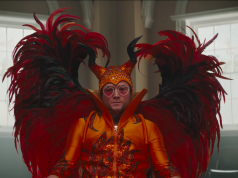If “Moulin Rouge” brought the movie musical back into vogue, “Chicago” should do a lot to keep it there.
The demise of the movie musical has been lamented much in the past several years. Before “Moulin Rouge” (2001), it had been 22 years (“All That Jazz”) since a live-action musical was nominated for a best picture Academy Award, and 33 years (“Oliver!”) since one had won.
Oscars aside, when was the last time that a movie musical found favor in the eyes of the American public? Madonna’s “Evita” (1996) failed to get audiences singing again; “Newsies” (1992) flopped and subsequently developed a cult following on video, but did little else. The Disney animated musicals did extraordinarily well in the early 1990s, but those ultimately waned in popularity, too. Somehow, it was no longer cool for movie characters to sing, not even in cartoons — unless they were making fun of musicals, as in the “South Park” movie (1999).
“Moulin Rouge” made musicals hip again, but functioned as something of a fluke. Nearly all of the songs were pre-existing pop tunes reworked for the movie, and the film was altogether much more stylized than an ordinary drama. Basically, if the audience could accept the frenetic editing and other oddities, it could — and did — accept that characters frequently burst into song, too.
Now comes “Chicago,” the first major film since “Evita” to be based on an existing live show. Such an undertaking is risky. We have already discussed America’s on-again/off-again love affair with musicals, which is currently on again but only tentatively. In addition to that, “Chicago” has been very popular as a stage musical, which means a film version runs the risk of alienating those fans. And if you offend the fans, and America in general isn’t interested in movie musicals, then who’s going to watch it?
The good news is that “Chicago” is a stupendously exhilarating film, so entertainingly assembled that I would not be surprised to hear applause burst forth from movie audiences at the end of the bigger numbers.
It is set in Chicago in the 1920s, when criminals could often parlay their notoriety into fame and fortune (just like today, in other words). Velma Kelly (Catherine Zeta-Jones), a vaudeville performer, has killed her husband and sister; Roxie Hart (Renee Zellweger) has killed her boyfriend; both are on Murderess’ Row awaiting trial, under the watchful eye of Matron “Mama” Morton (Queen Latifah). Billy Flynn (Richard Gere), a smooth-talking lawyer, assists them both, seeking his own fame and well-being as much as theirs.
The satire is trenchant and sly, ruthlessly mocking America’s love of villains, and the way anyone with a bit of savvy can manipulate public opinion to his (or her) advantage. As a satire, it does not delve deep into its characters psyches; these are types, not people, and that’s just fine.
I count myself a fan of musicals in general, and “Chicago” specifically — but I am also a fan of movies, and I recognize film is a medium that does not always work for musicals. “Chicago” works. Director Rob Marshall (a choreographer who directed the 1999 TV version of “Annie”) has deftly steered clear of the obvious problem — “Why do these ordinary people keep bursting into song?” — by staging the musical numbers as fantasies. For example, the “Cell Block Tango” number, in which the various women on Death Row recount their deeds, is two sequences interwoven. During the dialogue parts, we see what’s “really” happening: The women are sitting around the prison, telling stories. During the singing parts, we see them dressed in black underwear, bathed in red light, singing and dancing on a set that is a prison-nightclub hybrid. It’s an effective way of keeping the show’s songs intact without having to face the weirdness of vicious killers who warble in their cell blocks.
Most of the songs from the show made it to the film, the notable exceptions being “My Own Best Friend,” “I Know a Girl,” “When Velma Takes the Stand” and “Class” — most of Velma’s songs, in other words. As a result, the Velma character seems decidedly secondary to Roxie, while the stage version made them co-equals. This makes their eventual decision to team up a little less satisfying, but that may be a quibble.
Catherine Zeta-Jones and Renee Zellweger both sing and dance like stars, and Zeta-Jones’ seductive performance makes Velma’s secondary status seem like a compliment rather than a slam, like maybe more of her would have been too much of a good thing. Zellweger captures Roxie’s transition from naive would-be starlet into full-fledged media whore with perfect grace and humor.
They are good, yes, but they are overshadowed by — hang onto something here — Richard Gere. Is it just me, or does this guy always play really quiet, dull characters? And yet here he is as slick Billy Flynn, talking fast, singing beautifully, and razzle-dazzling his way into stealing the film out from under its female stars. It is easily his most charming performance in recent memory, maybe ever.
(His character also gets the two best metaphors: While acting as his client’s “mouthpiece,” we see him working as a puppeteer, manipulating the press and his client with equal agility; later, when he’s thrown a curveball in court, we see him perform both a literal and figurative tap-dance. I cannot stress enough how delightful the blending of reality and fantasy is in this film.)
It’s about time a movie gave us a reason to tap our toes again. Here’s to the resurgence of a grand Hollywood tradition.
A- (1 hr., 47 min.; )





